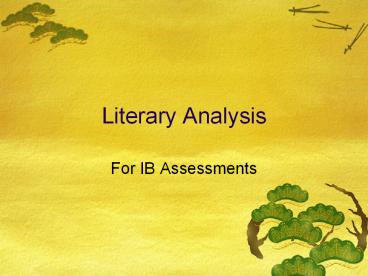Literary Analysis - PowerPoint PPT Presentation
1 / 27
Title: Literary Analysis
1
Literary Analysis
- For IB Assessments
2
Types of literary analysis
- Character
- Theme
- Setting
- Form
- Symbolism, Motif and Imagery
- Style
3
A strong character analysis will
- identify the type of character
- describe the character
- discuss the conflict in the story, as it relates
to the characters place in it
4
Characters can be
- protagonists or antagonists
- major or minor
- static or dynamic
- stereotypical (stock)
- Foils (opposite or weaker than protagonist)
- Heroes or Antiheroes
5
Heroes can be
- the anti-hero
- the tragic hero
- the romantic hero
- the modern hero
6
Consider if the character has changed during the
course of the story
- What was his/her motivation to change?
- How does the character learn from the change?
7
Social Aspects of Character
- How does the character view other characters?
- What do other characters say about this
character? - Do the characters actions support his/her
words?
8
External Conflicts
- man vs. man
- man vs. machine
- man vs. nature
- man vs. animal
- man vs. fate or destiny
- man vs. society
9
Internal Conflicts
- man vs. himself this is when the character has
an ethical dilemma - man vs. his mind this is the character with
internal problems that are not ethical, but
mental or emotional
10
Themes can be a
- concepts
- thoughts
- opinions or beliefs
- The theme allows the author to illustrate his
perceptions about life.
11
Theme Analysis
- Consider
- Direct statements
- Imagery and symbolism
- A characters thoughts or statements
- A character who stands for something
- Overall tone or moral of the work
12
(No Transcript)
13
Theme Analysis
- Motivation
- Why do the characters behave as they do, and what
motivates them?
14
Theme Analysis
- Tone
- What is the authors or narrators attitude
towards his subject?
15
Theme Analysis
- Values
- Does it seem like the author is making a value
judgment?
16
Analysis of Setting
- Explore how a works time and place affects
the events and/or the characters of the work. - Consider setting as part of another form of
literary analysis. - (extending the analysis of a character, for
example)
17
Setting Analysis
- the season
- time of day matters
- weather
- (Is it night, when things are often hidden? Is it
day, when things may be more clear?)
18
Setting Analysis
- Is any part of the setting symbolic?
- A castledefenses
- suburban homesafety
19
Setting Analysis
- How much time does the action cover?
- Are there jumps in hours, days, weeks, months,
years?
20
Setting Analysis
- How well does a character fit in with the
setting?
21
Setting Analysis
- Does the setting influence the plot or
characters? - If the characters are supposed to be strong
characters who triumph over evil, are they in
places where evil is around?
22
Setting Analysis
- Does the setting establish atmosphere or mood?
- A bright, sunshiny day?
- Is it a creepy old house that creaks?
- Is it a big open barn that smells of fresh hay?
23
Setting Analysis
- How is the setting presented ? With great detail?
Through a few suggestive details? Indirectly
through thoughts and actions?
24
Structure
- Does he use long or short sentences?
- Is dialogue short and conversational or
- long and involved?
- How are the sentences structured?
- Are the paragraphs short and choppy or long and
flowing? - Repetitive or varied?
- Are they all the same length or are some long and
flowing, others short and choppy? Why?
25
Style
- How does the author present his reality?
- What word choices do you notice?
- Are the descriptions blunt, vivid, detailed?
- What is the tone?
- What is the mood?
- Are there many literary devices?
26
Form
- How does the plotline look?
- Does it take a long time to get to the rising
action? - Is there a lot of attention on the climax?
- How are the acts and chapters divided?
- When do new characters enter?
- Does one event cause another to happen?
- Is there a crisis?
27
In conclusion
- The types of analysis overlap. Keep your focus
clear as you write your essay. - Are you focusing on the comparison of two
characters because you want to explore their
development and role in the conflict? - Are you focusing on the comparison of two
characters because you think they both embody a
the same thematic element?































